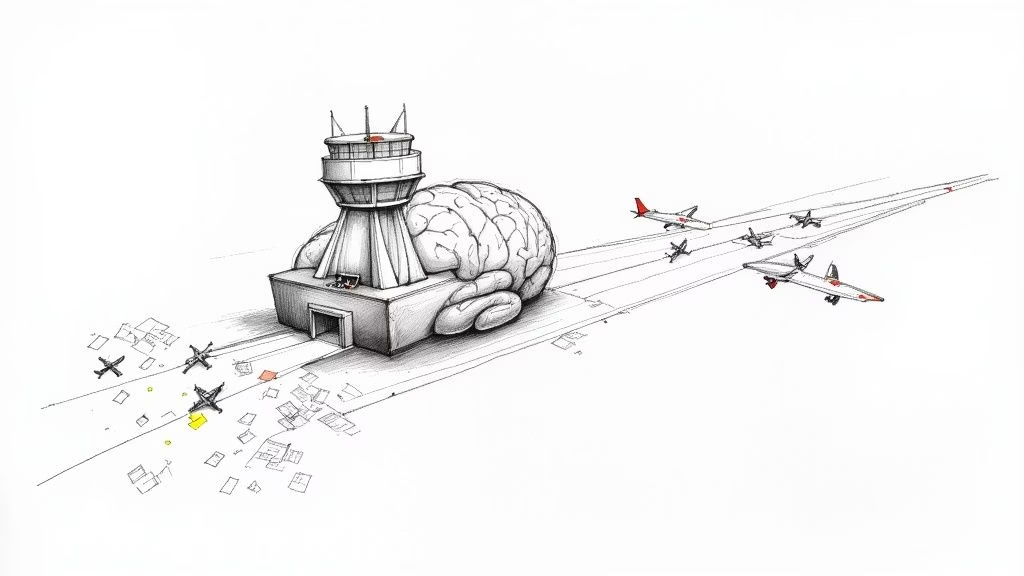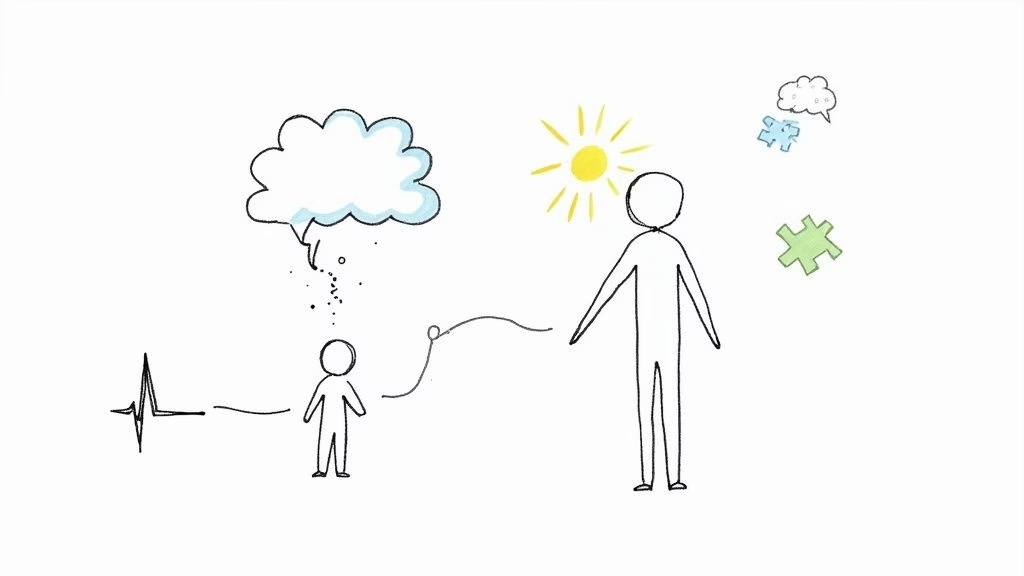Let’s be real—the phrase 'critical thinking' probably sounds like something you’d hear in a stuffy classroom. But what if it’s actually your secret weapon for cutting through the noise, whether you're scrolling through TikTok or dealing with a tough decision? It’s not about being negative or critical of everything. It's about learning to think for yourself.
Why Critical Thinking Is Your Most Valuable Skill
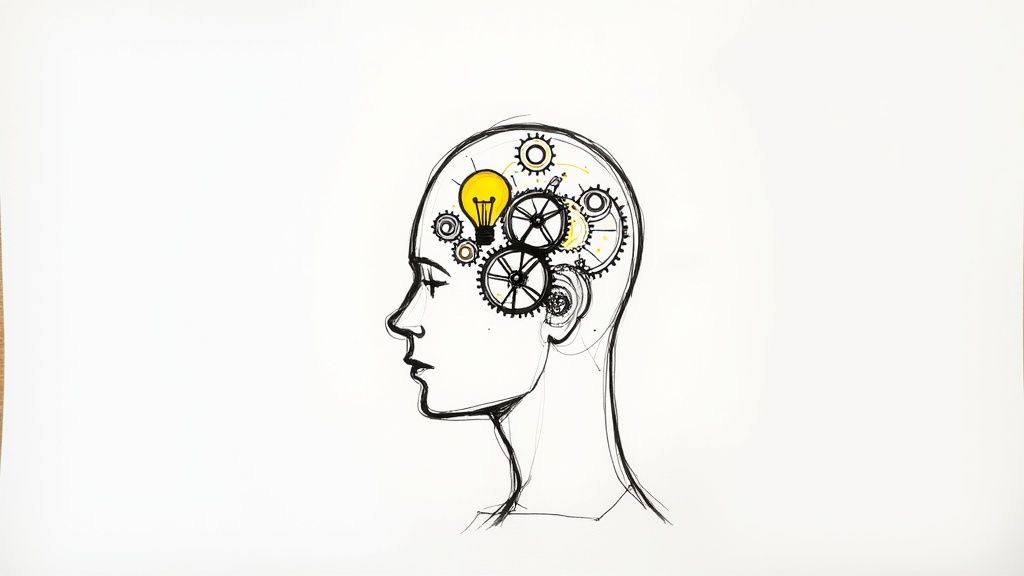
Think about it. You’re scrolling your feed and see a post making some wild claim. Without critical thinking, you might just accept it, share it, or let it twist your opinion without a second thought. It happens all the time.
But with this skill, you start asking the right questions. Who posted this? What are they trying to achieve? Is there any real proof here?
This isn’t just about social media, either. The same logic applies to school projects, arguments with friends, and even figuring out why you can't get motivated to finish that assignment. It’s the tool that helps you sift through the junk and make choices that are actually right for you.
Developing Your Mental Toolkit
Think of critical thinking as building a mental toolkit for life. It helps you get to the root of a problem instead of just dealing with the symptoms. Feeling overwhelmed? Instead of just stressing, you can step back, figure out what’s actually causing the pressure, and make a plan to handle it.
This skill has never been more important. Researchers actually saw a significant drop in critical thinking performance among students during the pandemic. While the numbers are bouncing back, it's a clear sign that these reasoning skills need to be actively practiced. You can dig into the critical thinking data trends to see how things have shifted for students.
To see how this works in the real world, let’s look at a few common situations teens face every day. The difference between reacting emotionally and responding thoughtfully is huge.
Critical Thinking in Everyday Situations
| Situation | Without Critical Thinking | With Critical Thinking |
|---|---|---|
| A friend spreads a rumor about you. | Immediately get angry and confront them, possibly making things worse. | Pause and ask: "Why would they say that? Is there a misunderstanding?" You decide to have a calm conversation to get their side of the story. |
| You see a "get rich quick" ad online. | Believe the hype and maybe even waste money on a scam. | Question the source. "Is this realistic? What's the catch?" You do some research and realize it's too good to be true. |
| You get a bad grade on a test. | Think, "I'm just bad at this subject," and give up. | Analyze what went wrong. "Did I study enough? Did I misunderstand the material?" You create a new study plan for the next test. |
These are small shifts, but they add up. Consistently applying this kind of thinking helps you stay in control of your reactions and your life.
Critical thinking is the art of analyzing and evaluating thinking with a view to improving it. It’s about taking charge of your own mind.
Ultimately, building this skill set is about becoming more independent and resilient. For teen guys and young men, it’s a powerful way to break down societal pressures and figure out what strength means to you, on your own terms. Finding resources like men's groups or mentorship programs can give you a space to practice this kind of thinking with others who get it.
When you build this foundation, you gain the confidence to handle whatever life throws at you—from academic pressure to making big decisions about your future.
Daily Exercises for Sharper Thinking

Getting better at critical thinking doesn’t mean you have to lock yourself away and study for hours. It’s actually about building small, consistent habits that train your brain to look deeper.
These simple exercises can be woven right into your daily routine. They turn everyday moments—like scrolling through your phone or reading for class—into real opportunities for sharper thinking.
A huge piece of this is learning to question the information you consume. In fact, some of the best daily exercises are simply the 9 proven ways to improve your reading comprehension. When you read with a purpose, you're not just taking in words; you're actively evaluating what someone is trying to tell you.
Use the 5 Whys Technique
One of the most powerful tools I’ve ever used is the "5 Whys" technique. It’s a dead-simple method for digging past the surface of a problem to find out what’s really going on. It works for everything, from struggling in school to feeling unmotivated.
Instead of just accepting a problem, you ask "Why?" five times to drill down to the core.
Let’s use a common one: procrastination.
- Problem: I keep putting off my history essay.
- Why? Because I have no idea where to even start.
- Why? Because the topic feels way too big and overwhelming.
- Why? Because I haven't broken it down into smaller, manageable parts.
- Why? Because I’m worried I won't do a good job.
- Why? Because I’m afraid of getting a bad grade and feeling like a failure.
See what happened there? The problem isn’t laziness. The root cause is a deep-seated fear of failure. Trying to fix that fear is a lot more productive than just yelling at yourself to "stop procrastinating." This technique forces you to stop treating the symptom and start addressing the real issue.
The goal isn’t just to find an answer, but to understand the real question. Asking "why" repeatedly peels back the layers of a problem to reveal what’s really going on underneath.
Spot the Agenda
Think about your social media feed or the news you watch. Almost everything you see is designed to influence you in some way. A great daily exercise is to practice "Spotting the Agenda."
As you scroll, just pause on a post. It could be from an influencer, a news outlet, or an ad. Then ask yourself these questions:
- Who made this? A regular person, a brand, a political group?
- What do they want me to do or believe? Are they trying to sell me something, get me to support a cause, or just make me feel a certain way?
- What's being left out? Is there another side to this story I'm not seeing?
This isn’t about becoming cynical. It’s about being aware. When you can recognize the bias and intent behind the information you see, you can filter it intelligently instead of just reacting to it.
This mental workout strengthens your ability to analyze arguments on the fly, whether you’re online or just talking with friends. For guys navigating all the social pressures out there, this skill is crucial for building real confidence and independent judgment. It empowers you to form your own opinions based on facts, not just feelings.
Another great way to build this mental muscle is through meditation. Even a simple five-minute mindfulness practice can train you to observe your thoughts without immediately buying into them. This creates the mental space you need for clear analysis.
If you want more ways to manage your thoughts and approach challenges strategically, check out our guide on how to develop problem-solving skills.
Overcome Procrastination and Boost Your Motivation
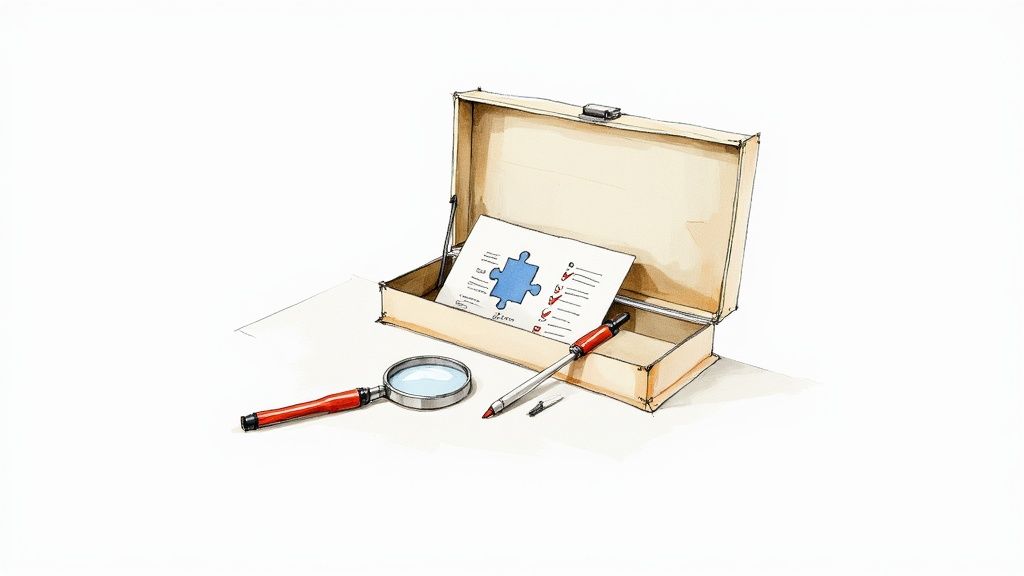
Procrastination isn’t about being lazy; it's usually a sign of something deeper going on. It’s that feeling of staring at a massive school project, completely stuck, not even knowing where to start. This is where critical thinking becomes your best tool for getting unstuck.
Instead of letting that overwhelm shut you down, you can use your mind to break the problem apart. It’s about switching from "This is impossible" to "Okay, how can I tackle this?" This isn't just a useful skill for school—it's exactly what future employers are looking for.
By 2025, analytical thinking is expected to be the number one skill employers want, with about 70% of companies calling it essential. Why? Because people who can think critically solve tough problems on their own. You can read more about what the future of work looks like at Human Resources Online.
Deconstruct Your To-Do List
First things first: stop looking at the entire mountain you have to climb. Use critical thinking to break that huge, scary task into tiny, manageable steps.
So, instead of a to-do list that just says, "Finish History Paper," make a micro-list.
- Choose a specific topic and get it approved.
- Find five good sources.
- Write a one-paragraph outline.
- Draft just the introduction.
See the difference? Each step is small and doable. Ticking one off gives your brain a little hit of dopamine, which builds the momentum you need to keep going. This whole process is a key part of strong executive functioning, the skills that help you plan, focus, and get things done.
Identify Your Procrastination Triggers
Motivation doesn't just show up out of nowhere. A lot of the time, a lack of it comes from hidden fears or just plain confusion. A great strategy is to start a "procrastination log." For one week, every time you catch yourself avoiding something, jot down what you did instead and how you were feeling in that moment.
After a week, take a look at your log. Is there a pattern? Do you start scrolling on your phone when you're afraid of not doing a perfect job? Do you get distracted when you're confused about the assignment?
Uncovering the 'why' behind your procrastination is the most critical step. Once you identify the real reason—fear of failure, boredom, or confusion—you can address the root cause instead of just fighting the symptom.
This kind of self-awareness is powerful. If you realize you're confused, you know you need to ask a teacher for help. If you're scared of failing, you can give yourself permission to just get a messy first draft done.
Parenting Tips for Fostering Motivation
For parents, helping a teen through this takes patience and the right approach. Simply telling them to "try harder" rarely works. Instead, guide them in applying critical thinking to their own challenges.
- Ask Guiding Questions: Instead of just giving them the answers, ask things like, "What's the very first, smallest thing you need to do for this project?" or "What part feels the most confusing?" This helps them think through the problem for themselves.
- Celebrate the Process, Not Just Results: Praise them for breaking down a big assignment or for starting their homework without being reminded. This reinforces the small habits that actually beat procrastination.
- Validate Their Feelings: Acknowledge that feeling overwhelmed is real and normal. Just saying, "I get it, this seems like a lot," can create a safe space for them to open up about what's really holding them back.
By learning to think critically about their work habits and emotions, teens can stop being victims of procrastination and start taking charge of their own success.
A Critical Thinker's Guide to Mental Wellness
We spend a lot of time applying critical thinking to schoolwork, online articles, or debates with friends. But what happens when you turn that powerful lens inward? It can be an absolute game-changer for your mental health.
It’s all about learning to observe your own thoughts and emotions without immediately accepting them as gospel. This one skill helps you manage stress, build resilience, and start to understand what’s really going on inside your head.
For a lot of teens, especially young men, there’s this unspoken pressure to just tough it out and push through difficult feelings. But building your critical thinking skills gives you a practical toolkit to actually analyze those feelings instead of just burying them. Instead of getting stuck in a negative thought loop, you can hit pause and ask, "Hang on, is this thought actually true? What evidence do I have to back it up?"
This is the core of the process—questioning, analyzing, and then deciding what's real. It works for everything, including your own mental state.
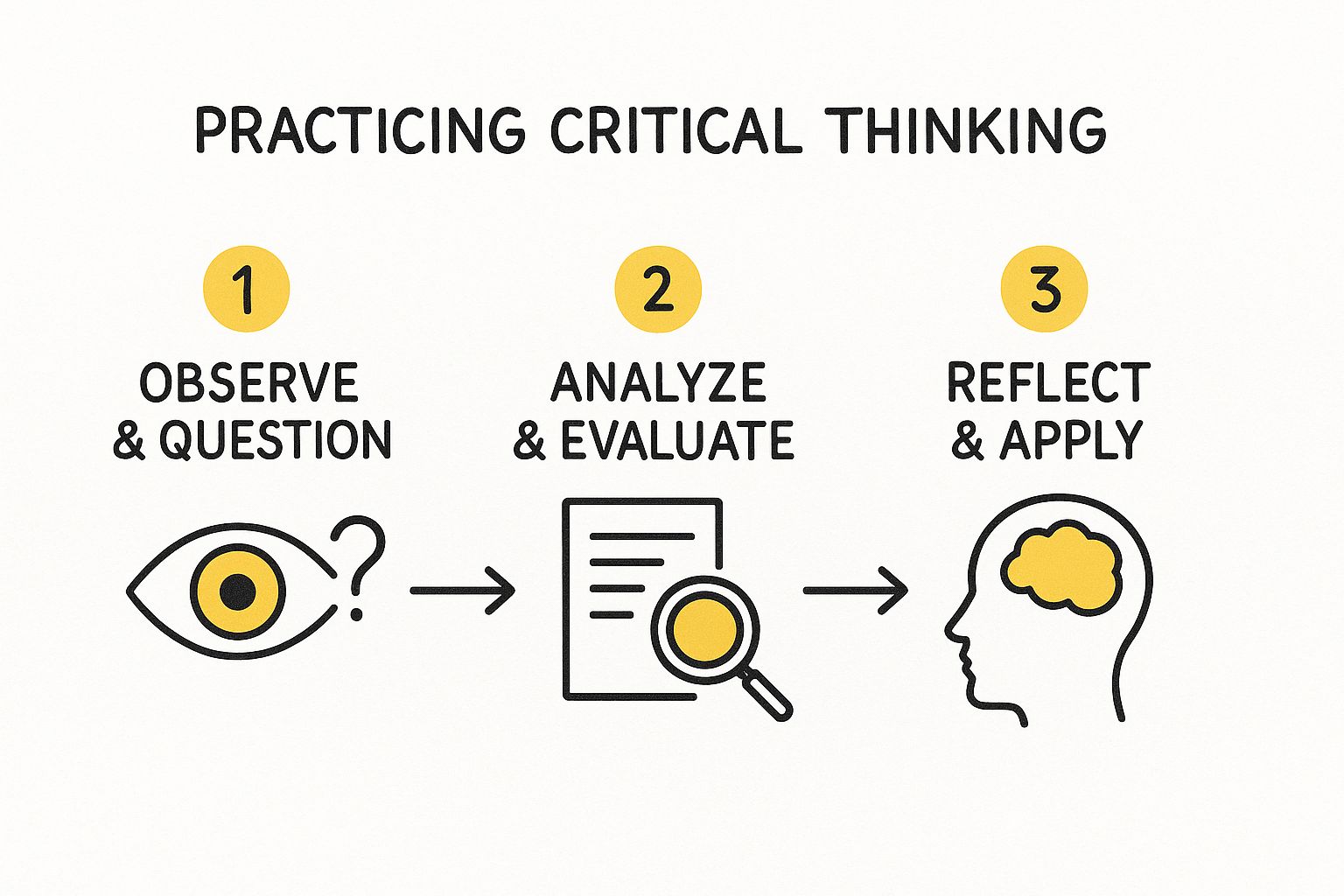
As the infographic shows, it's a cycle. You question, you analyze, you apply what you learn. It's an incredibly powerful method for getting to know your own mind.
A Simple Mindfulness Practice for Teens
Meditation isn’t some mystical practice where you have to empty your mind completely. That’s impossible. It's really just about paying attention to your mind without judgment. This quick five-minute exercise can help you create the mental space you need to think clearly and calmly.
Here's a simple mindfulness exercise you can try right now to start observing your thoughts instead of being controlled by them.
| Mindfulness Technique for Clearer Thinking | ||
|---|---|---|
| Step | Action | Purpose |
| 1. Find Your Spot | Sit comfortably in a chair or on the floor. No need for a pretzel pose—just aim for a relaxed but upright posture. | To create a dedicated, calm space for a few minutes of focus. |
| 2. Tune Into Your Breath | Gently close your eyes. Take a few slow, deep breaths. Pay attention to the feeling of the air moving in and out of your body. | This grounds you in the present moment and gives your mind a simple anchor. |
| 3. Just Observe | Your mind is going to wander. Guaranteed. When a thought pops up, just notice it without judging it. Imagine it’s a cloud passing by in the sky. | The goal isn't to stop thinking, but to stop getting carried away by your thoughts. |
| 4. Gently Return | Once you've noticed the thought, gently guide your focus back to the sensation of your breath. | This trains your "attention muscle" and reinforces your role as the observer. |
| 5. Repeat for 5 Minutes | Continue this process for just 5 minutes. Set a timer so you don't have to worry about the time. | Consistency is key. A short, regular practice is more effective than a long, occasional one. |
This simple practice builds your ability to self-reflect and is a cornerstone for managing how you respond to stress. For any critical thinker, handling stress and getting good sleep are non-negotiable for staying sharp. If you're curious about natural aids, it can be helpful to read how others have approached managing stress and improving sleep with Ashwagandha.
Resources for Teen Mental Health
Knowing when and where to get support is a critical part of mental wellness. If you feel like you’re struggling, these resources are here to help you out. No judgment.
- Crisis Text Line: Text HOME to 741741 from anywhere in the US, anytime. It’s free, confidential, and available 24/7.
- The Jed Foundation: This organization offers fantastic resources and support specifically for teens and young adults to help protect emotional health and prevent suicide.
- Local Men's Groups: Organizations like The Mankind Project or EVRYMAN create communities for young men to find support while navigating life's challenges.
Applying critical thinking to your mental health means treating your thoughts as data, not directives. Question them, analyze them, and decide for yourself what is true.
For guys struggling with the pressure to have it all figured out, remember this: seeking help is a sign of strength, not weakness. It's you taking control. Using these resources, combined with self-reflection, empowers you to own your well-being.
If you want to dive deeper into handling life's pressures, our guide on stress management for teens has a ton more practical strategies you can use.
Finding Your People and Sharpening Your Mind
Navigating the world today can feel like a minefield. For young men, it's even trickier. You're constantly hit with mixed messages about what it means to be strong, successful, or a "real man." This is where finding a solid community and the right resources isn't just nice—it's non-negotiable for building the critical thinking skills you need.
Let’s get one thing straight: real strength isn't about having all the answers or putting on a tough front. It’s about having the guts to ask hard questions, to call out old-school stereotypes about masculinity, and to figure out what success means to you. That kind of strength requires some serious emotional muscle, a curious mind, and people in your corner who get it.
When you find the right community, you get a space to talk about real stuff—from the pressure to succeed at school and the black hole of procrastination to mental health—without someone judging you. It’s the training ground for thinking critically about the world and your role in it.
Where to Find Your Crew and Support System
Getting connected with people who are on a similar path is a game-changer. These communities aren't just about hanging out; they’re about finding mentors, seeing positive role models in action, and leveling up your emotional intelligence right alongside your practical life skills.
Not sure where to start? Try these:
- Mentorship Programs: Look around for local or even national programs that pair you up with experienced mentors. These guys have been there and can offer real-world advice.
- Men's Groups: Organizations like EVRYMAN are creating spaces where guys can actually connect, talk honestly, and build emotional fitness. It’s a workout for your mind and spirit.
- Online Hubs: There are tons of platforms out there dedicated to personal growth for young men. You can find podcasts, articles, and forums that cut through the noise and offer real value.
Redefining strength is all about tearing down the flimsy, harmful stereotypes and building something real in its place—something based on honesty, self-awareness, and a sharp mind. It’s about writing your own script, not just acting out someone else’s.
Why This Matters for Your Future
Building these personal skills isn't just about feeling good—it's a massive career advantage. The jobs of the future won't go to robots; they'll go to humans who can think in ways machines can't.
The World Economic Forum predicts that skills like analytical thinking, innovation, and complex problem-solving will be some of the most in-demand skills through 2030 and beyond. In fact, jobs that require these uniquely human skills are expected to grow three times faster than other roles. Want to dig into the data? You can find out more about the future of human skills in the workplace.
A Quick Word for Parents and Guardians
If you're supporting a teenage boy on this journey, your job isn't to direct—it's to guide. Think of yourself as a coach, not a commander. The goal is to create an environment where he feels safe enough to figure out who he is and how he thinks.
- Show Him Different Kinds of Strength: Don't just point to athletes or CEOs. Introduce him to stories of men who show strength through kindness, creativity, and resilience.
- Be Open About Your Own Stuff: Talk about your own struggles and feelings. This is how you show him that being vulnerable isn't weak; it's one of the strongest things a person can do.
- Listen More, Fix Less: When he comes to you with a problem, fight the urge to jump in with a solution. Instead, ask questions that put the ball in his court. "What are your options here?" or "What's your gut telling you to do?" This is how he learns to solve his own problems.
Got Questions About Critical Thinking? Let's Talk.
When you're trying to build a new skill like critical thinking, questions are a good thing. They mean you're engaged. Here are some of the most common ones I hear from teens and parents, with straight-up answers to help you put these ideas into practice.
How Can I Help My Teen Develop Critical Thinking as a Parent?
This is a big one. The best thing you can do is shift from being a "director" to a "guide." It’s tempting to jump in and solve problems for them, but that actually robs them of a chance to learn.
When your teen hits a wall, instead of handing them the answer, try asking questions that spark their own thinking. "What have you already tried?" or "Is there another way to look at this?" are great places to start.
This teaches them to analyze a situation on their own. It also helps to be transparent about your own process. When you're making a decision, talk it out. Let them hear you weigh the pros and cons or question the source of a piece of information.
The real secret? Create a home where it’s safe to ask questions and where mistakes are treated as data, not disasters. That’s the environment where a critical thinker is born.
My Teen Son is Struggling with Motivation. What Resources Can Help?
Motivation is a tricky thing. For a lot of young men, it's deeply connected to feeling like they have a purpose and are understood. When that's missing, everything else can feel pointless. Getting them connected with positive role models and a solid community can be a game-changer.
- Men's Groups: Organizations like EVRYMAN and The Mankind Project are incredible. They offer spaces where young men can talk about what's really going on without judgment and build the emotional toolkit they need.
- Mentorship Programs: Look for local or national mentorship programs. Connecting a teen with an adult who can offer guidance on school, careers, or just life in general can provide a powerful sense of direction.
- Mental Health Support: Sometimes, a lack of motivation is a sign of something deeper. Resources like the Crisis Text Line (text HOME to 741741) or The Jed Foundation provide immediate, confidential support for teens who are feeling overwhelmed.
These aren't just links; they're lifelines. They offer community and tools for building resilience, which is the foundation for both motivation and sharp thinking.
Is There a Simple Meditation I Can Teach My Teen for Better Focus?
Absolutely. Meditation is basically a workout for your brain's "attention muscle." It teaches you to notice your thoughts without letting them drag you away. Better focus is a direct result, and that's essential for deep thinking.
Here’s a simple five-minute mindfulness practice you can do anywhere:
- Find a quiet spot. Sit down in a way that’s relaxed but not slumped over.
- Close your eyes and just take a few slow, deep breaths. Feel the air come in and go out.
- Let thoughts come and go. You don’t need to fight them. Just imagine them as clouds drifting by.
- Bring your focus back to your breath. Every time your mind wanders (and it will!), just gently guide your attention back. This is the whole exercise.
- Do this for five minutes. Set a gentle timer so you're not wondering when it's over.
This simple act of returning your focus, again and again, builds the mental strength needed to cut through the noise that feeds procrastination and disengagement at school.
At Andrew Petrillo Life Coaching, I work one-on-one with teens to give them the practical strategies they need to beat procrastination, manage stress, and find their drive. If you’re ready to build the focus and confidence to own your future, let’s talk. Schedule your complimentary discovery call at https://andrewpetrillolifecoaching.com.

















